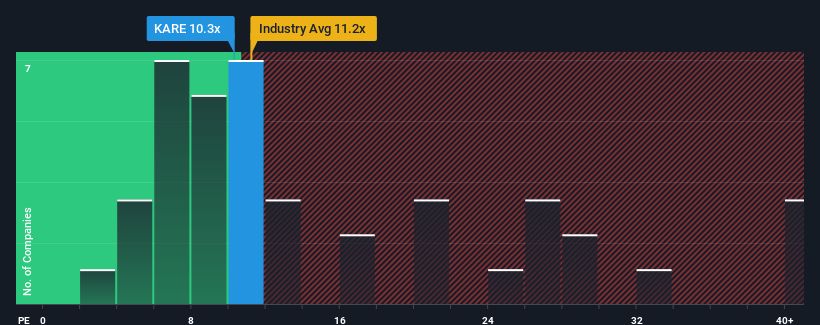- Israel
- /
- Real Estate
- /
- TASE:KARE
Kardan Real Estate Enterprise and Development Ltd's (TLV:KARE) Subdued P/E Might Signal An Opportunity
Kardan Real Estate Enterprise and Development Ltd's (TLV:KARE) price-to-earnings (or "P/E") ratio of 10.3x might make it look like a buy right now compared to the market in Israel, where around half of the companies have P/E ratios above 13x and even P/E's above 22x are quite common. Nonetheless, we'd need to dig a little deeper to determine if there is a rational basis for the reduced P/E.
As an illustration, earnings have deteriorated at Kardan Real Estate Enterprise and Development over the last year, which is not ideal at all. It might be that many expect the disappointing earnings performance to continue or accelerate, which has repressed the P/E. However, if this doesn't eventuate then existing shareholders may be feeling optimistic about the future direction of the share price.
See our latest analysis for Kardan Real Estate Enterprise and Development

How Is Kardan Real Estate Enterprise and Development's Growth Trending?
In order to justify its P/E ratio, Kardan Real Estate Enterprise and Development would need to produce sluggish growth that's trailing the market.
Retrospectively, the last year delivered a frustrating 42% decrease to the company's bottom line. However, a few very strong years before that means that it was still able to grow EPS by an impressive 175% in total over the last three years. So we can start by confirming that the company has generally done a very good job of growing earnings over that time, even though it had some hiccups along the way.
This is in contrast to the rest of the market, which is expected to grow by 25% over the next year, materially lower than the company's recent medium-term annualised growth rates.
With this information, we find it odd that Kardan Real Estate Enterprise and Development is trading at a P/E lower than the market. It looks like most investors are not convinced the company can maintain its recent growth rates.
What We Can Learn From Kardan Real Estate Enterprise and Development's P/E?
Using the price-to-earnings ratio alone to determine if you should sell your stock isn't sensible, however it can be a practical guide to the company's future prospects.
We've established that Kardan Real Estate Enterprise and Development currently trades on a much lower than expected P/E since its recent three-year growth is higher than the wider market forecast. When we see strong earnings with faster-than-market growth, we assume potential risks are what might be placing significant pressure on the P/E ratio. It appears many are indeed anticipating earnings instability, because the persistence of these recent medium-term conditions would normally provide a boost to the share price.
You need to take note of risks, for example - Kardan Real Estate Enterprise and Development has 4 warning signs (and 1 which is potentially serious) we think you should know about.
You might be able to find a better investment than Kardan Real Estate Enterprise and Development. If you want a selection of possible candidates, check out this free list of interesting companies that trade on a low P/E (but have proven they can grow earnings).
Valuation is complex, but we're here to simplify it.
Discover if Kardan Real Estate Enterprise and Development might be undervalued or overvalued with our detailed analysis, featuring fair value estimates, potential risks, dividends, insider trades, and its financial condition.
Access Free AnalysisHave feedback on this article? Concerned about the content? Get in touch with us directly. Alternatively, email editorial-team (at) simplywallst.com.
This article by Simply Wall St is general in nature. We provide commentary based on historical data and analyst forecasts only using an unbiased methodology and our articles are not intended to be financial advice. It does not constitute a recommendation to buy or sell any stock, and does not take account of your objectives, or your financial situation. We aim to bring you long-term focused analysis driven by fundamental data. Note that our analysis may not factor in the latest price-sensitive company announcements or qualitative material. Simply Wall St has no position in any stocks mentioned.
About TASE:KARE
Kardan Real Estate Enterprise and Development
Plans, constructs, develops, builds, and manages residential building and income-producing properties in Israel.
Moderate risk with imperfect balance sheet.
Similar Companies
Market Insights
Community Narratives



